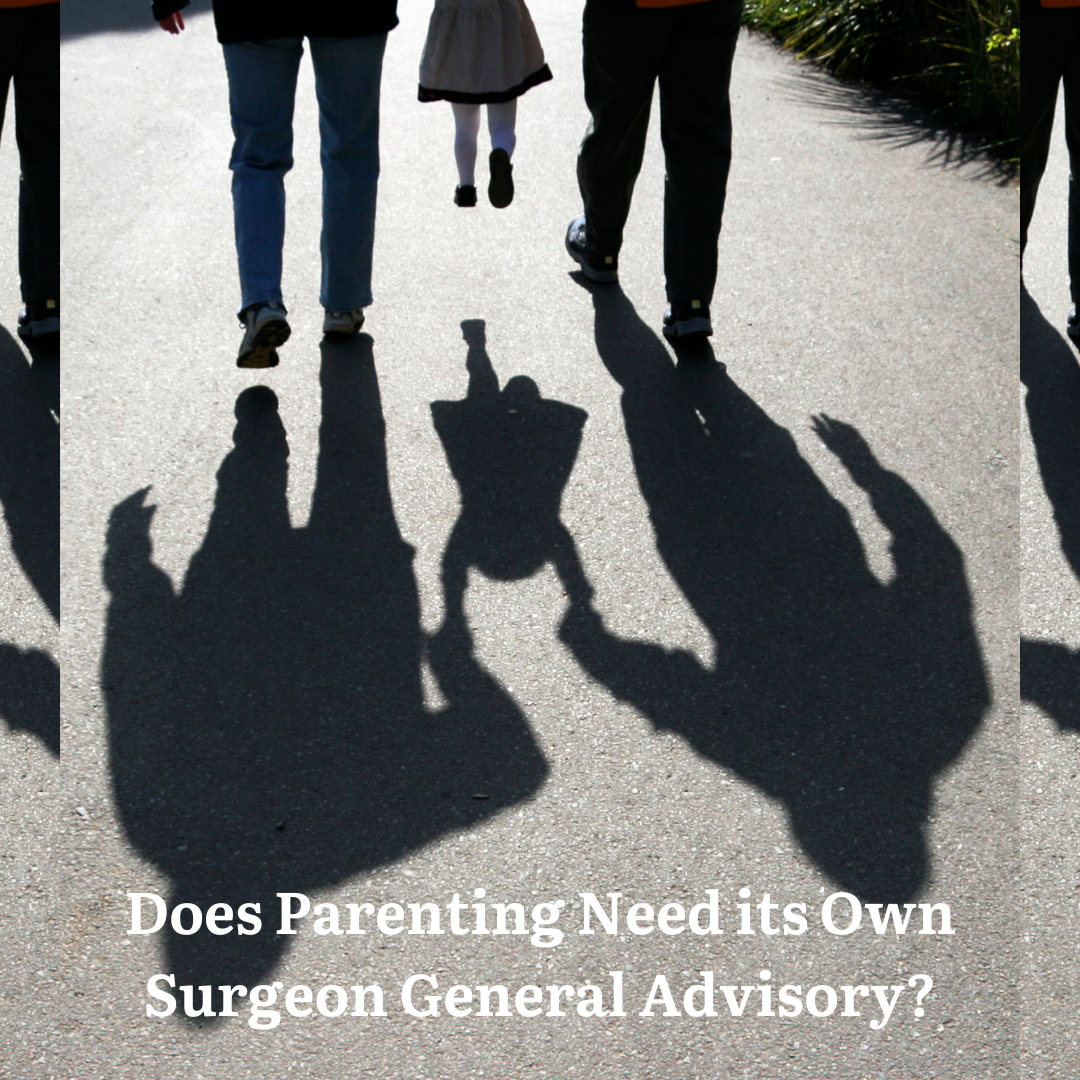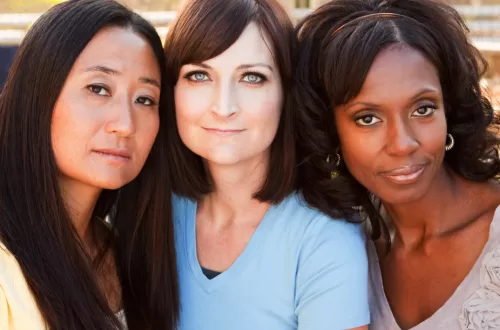Last week the Surgeon General released an advisory on Parental Stress and Well-Being. If reading Surgeon General Advisories isn’t your thing, here are the cliff notes: It is a uniquely challenging time to find yourself in the role of a parent. The challenges of parenting and the stress it produces can translate to mental health issues for parents which in turn has implications for our children, communities, and economic productivity. There are things that bosses, community institutions, and potentially even governments can do to help.
General Responses to the Advisory
As a mother of four, it felt a little strange to have a public health advisory for an experience as universal as parenting. Comments on media outlets seemed to indicate that many don’t see such a warning as a necessity. The comments section seemed split–ranging from mildly incredulous to feelings of validation. Someone suggested the article was satirical on one major news outlet. “Good things aren’t easy” read another comment. In a conversation about the advisory, a close friend said, “Surely raising ten children during the Great Depression was at least as stressful.”
But private conversations with parents–unprompted by this advisory–validate the Surgeon General’s claim that today’s stressors differ from previous generations. According to the advisory, parents spend more time in both employed work and primary child care today than they did forty years ago. The increased cost of raising a child almost requires those increased work hours. The decline of civic and social institutions has resulted in greater loneliness and a sense of isolation as parents navigate these issues. This crisis of solitude is increasingly referred to as an epidemic–complete with its own Surgeon General Advisory.
Those bothered by the advisory don’t seem riled by the notion that parenting is difficult. It’s the idea that parenting is so substantially different at this time in history that it merits a warning historically reserved for major public health crises like smoking or AIDS that seems to bother people. People have been parenting for as long as human life has existed. Surely we can navigate this historically universal experience without support from the nation’s top doctor.
Historically Unique Stressors
I halfway expected this response when I mentioned the advisory to some Boomers whose children belonged to Generation X. But they were surprisingly sympathetic. They acknowledged that raising kids was tough in their day, but we “didn’t have to worry about our children killing themselves” said one. “And we didn’t have the internet,” said the other implying what we all already know. Technology takes as much as it gives to modern families.
But as challenging as modern parents have it, statistically speaking, previous generations also weren’t free from concern. Those Gen X moms probably did need to worry more about their children killing themselves. The ’80s and ’90s were peak years for homicide and suicide. Though rates have increased for Gen Z women, and for all people in the last decade, overall rates have been lower than when Gen Xers were teenagers and young adults until just recently. It’s true. Parents of Millenial and Gen X children didn’t experience technology in the same way. But their kids were very much at risk for deaths of despair.
So what’s the real issue here? Is it our perception of challenges that have changed or are parents faced with historically unique stressors?
Personally, I think it’s a little bit of both. The negative bias modern technology promotes has certainly contributed to a collective hyper-awareness of our challenges. It has also contributed to a trend of intensive parenting that raises expectations of parents. But the week after the advisory was released, parents were inundated with news of another school shooting. This increasingly common headline makes the historically mundane task of sending children to school each morning take a unique mental toll. In many ways, our generation of parents has been dealt a different deck of cards than those before us.
So yes, we’re dealing with uniquely challenging circumstances. But our perception of those challenges and our expectations of ourselves seems to compound the challenges.
Does the Advisory come with Solutions?
The advisory makes some thoughtful suggestions including bolstering social institutions and addressing unhealthy cultural attitudes towards parents. Parents today are putting in more hours at home and at work, and they need support from social networks and civic institutions. I couldn’t agree more. I’ve personally experienced the incredible power of social connections while raising my children in a context that values family and family life.
The advisory also suggests that we reduce that stress through open dialogue as a means of normalizing it. It doesn’t really address the expectations game or our perception. Instead, the advisory seems more focused on acknowledging the challenges. As my grandma would say when she disagreed with a nice person, “his heart’s in the right place.”
Some experts believe that we’re actually talking too much about stressors and mental health. And that may be partially to blame for the rise in symptoms–especially in kids. In fact, it seems that the focus on challenges facing parents and young adults may actually be creating an effect where parents feel their situation is uniquely challenging and uniquely out of their hands. This aligns to the generational trend toward the belief that our lives are controlled by outside forces rather than our own efforts–or an external locus of control.
It’s not obvious that this has been an effective way to think about the challenges we face as parents. Depressed, helpless symptoms identified in this advisory are actually the predictable outcomes of such externalized thinking. I’m not trying to gaslight parents and suggest parents deny the existence of challenges. Without a doubt, we are dealing with historically unique and complex challenges. Some exist so far outside the realm of our control or ability to change–we can understandably feel helpless.
An Alternate Path Forward
Our response to that helpless feeling can dramatically alter how we experience difficulty. How we respond to those challenges is just as important as the challenges themselves. On an individual level, some of the most successful therapeutic interventions are those that actively challenge negative thought patterns in an effort to change depressive or anxious thoughts rather than passively own them. Maybe we can collectively take a page out of the clinician’s book and challenge both our expectations and perceptions.
What does it look like to challenge these thought patterns? The path forward might be to exert our own agency and scrap some of the unreasonable expectations that we have for ourselves–at work and at home. Maybe we don’t need a spotless house. Our elementary children might benefit from playing outside while we cook dinner. And our boss can wait until tomorrow for us to respond to that after-hours message on Slack.
We can also assert some control over our response and the way we think about the circumstances we can’t change. I’m not saying the world isn’t full of darkness and difficulty. I actually think it is. But I’m full of light. And I want my home to be one full of joy, light, and resilience. We might not be able to change everything, but we can take on a resilient posture as we face the darkness of our generation.
When my kids look back on how I taught them to navigate the challenges of this time, I hope they see more than just passive resolve. I hope they see someone focused not on the challenges and difficulty, but on walking through those challenges from a position of hope and joy. And in the observation, maybe some of that courage will be transmitted to them as well. This is our time on planet Earth. These are the circumstances in which we will parent our children. Let’s take on a resilient posture and do so with strength and hope.
If you are having thoughts of suicide, call or text 988 to reach the 988 Suicide and Crisis Lifeline or go to SpeakingOfSuicide.com/resources for a list of additional resources. Go here for resources outside the United States.





